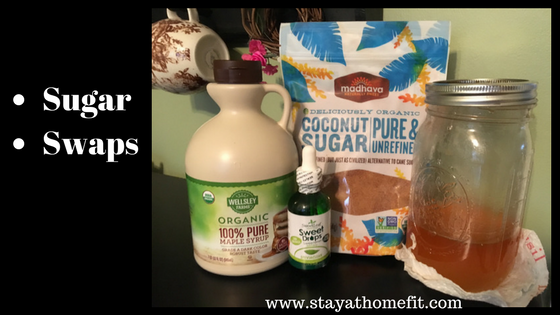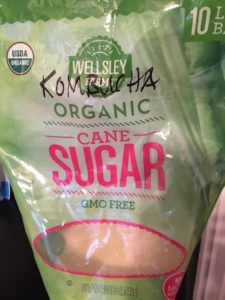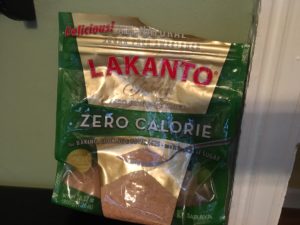Sugar is so bad. It’s bad for you, it’s addicting, it’s everywhere. It’s been linked to all sorts of bad things, including cancer and diabetes. It’s also been shown to negatively affect your gut flora and immune system. But finding a sugar substitute can be overwhelming. I gave up on doing exhaustive research and am just putting out there what I have gathered so far…

And when I say sugar here, I am referring to white sugar, not sugar as it relates to the sugar content in food.
First of all I think it’s important to say please don’t consume artificial sweeteners like Sweet ‘n Low, Splenda, Equal, etc. Don’t drink drinks sweetened with them, like juices that claim to be healthier because they replace some of the natural sugar found in juice with chemical sweeteners. Artificial sweeteners are chemical nastiness, and to top it off they might even cause weight gain. I am not a soda drinker, but if I were to have a soda I would pick a regular over a diet for sure.
- So what are some good sugar alternatives? The picture above shows the sugar swaps I use the most: maple syrup, honey, and stevia. They are the most natural, the least processed; they even have some health benefits. Be careful with Stevia- it’s hard to find stevia that’s just stevia. Sweet Leaf is the best I’ve found and it has “natural flavors” on the ingredient list, something I usually try to avoid. If you look at Truvia, for example, I think the first ingredient is dextrose- not Stevia. I’d like to try baking with powdered stevia, but I haven’t found one without additives.
- Coconut sugar is great for baking. I usually have that around, too. (I did read somewhere along the line that coconut sugar is not sustainable which brings me some Earth guilt. So I don’t use it regularly, and keep meaning to do some follow-up on that. I’ll share when I know more.)
- I use raw sugar or turbinado for baking, too. It’s from the same sugar cane that white sugar comes from, but is much less processed. The taste is very much the sugar taste you’re used to.
- I also use organic sugar sometimes. It’s less coarse than raw sugar. It’s not healthy- it’s still cane sugar and it’s processed, but it’s better than white sugar. That’s what I use for my kombucha too, hence the Sharpie-written “kombucha” on the bag.

- I really like Lakanto, which is made from erythritol (a sugar alcohol) and a monk fruit extract. It’s a bit expensive, though, and I know some people would discourage using erythritol. It is a one to one substitute, though, and the taste and texture are close to sugar. I’ve used it to make baked goods for my own use (like healthy muffins and granola that my kids wouldn’t eat). Another sweetener I’m intrigued by, but haven’t used, is just pure monk fruit, minus the erythritol. Sounds healthy, but it’s very expensive.

- Xlyitol is another sugar alcohol used as a sweetener. It is derived from plant material, but probably highly processed. It’s questionable from a wholesomeness perspective, but from a fitness perspective probably a good option. Same for erythritol. These have less impact on blood sugar, but may have other side effects that cause concern.
- Dates are a great natural sweetener, but it’s hard to work with them. I bought them to make some kind of bar once and it was a nightmare. If you are handier around the kitchen than me (or have a higher power food processor) these could be a great option! I recently saw a powdered date sugar; it’s just dried dates ground up to a powder. I might have to try that one day.
I avoid agave and have never even bought it. I know this is one you might hear a lot about. Early on in my clean eating journey I read something negative about it and haven’t read anything to convince me otherwise. Again, it probably comes down to the fact that it’s highly processed and in the end not much better than sugar.
If you’re not ready to get rid of the evil, processed, white stuff, at least go for organic sugar, preferably raw sugar. You’ll avoid some of the harsh chemicals that come along with the processing that happens with regular white sugar.
And all sweeteners should be used in moderation. Honey, for example, is wonderful and natural and wholesome, but eating too much of it can still negatively affect your body.
Again, I found looking at all the different alternatives confusing and overwhelming….I feel like this post might be too! This week I’ll share some links to sites that offer more comprehensive information on sugar swaps. Stop by my Facebook page to check them out!
Is there a sugar swap you use that I didn’t mention here? I’d love to hear about it!
Leave a Reply